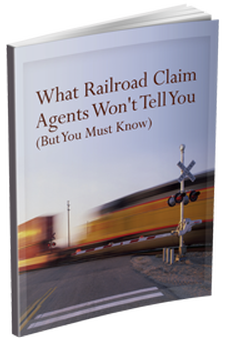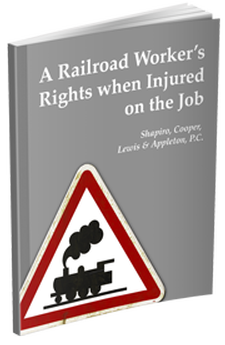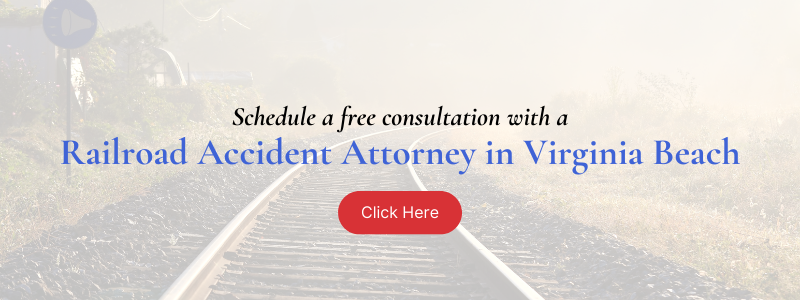Whether it was a railroad accident or disease, a derailment, or a railroad crossing accident, one of these events may be the reason you are searching on our railroad accident info page. If you or a loved one was seriously injured in a railroad accident in Virginia or beyond, we are here to help. This page was created to help those suffering after a railroad accident, whether you were hurt while working at the rail yard or you developed an occupational disease such as mesothelioma, COPD, or another form of cancer.
The nationally recognized railroad/FELA lawyers with our law firm have successfully represented hundreds of railroad workers in every craft, including engineers, conductors, shop workers, signal workers, and track maintenance workers (called maintenance of way workers) in every type of injury and occupational disease case. Present and former attorneys are leading voices in the national small league of well-experienced railroad/FELA attorneys and have handled cases in every eastern United States state including other states east of the Mississippi River.
Leaders in Railroad Injury Law
Firm partner Richard N. Shapiro has twice served as Chair of the Railroad Law Section of the nation’s largest trial lawyers association, specifically the American Association for Justice. In addition, Rick is the co-author of a legal treatise on railroad law titled, Railroad Health and Safety; a Litigators Guide. Rick is recognized as a national authority on railroad worker injury law possessing in-depth knowledge of the FELA statute. He has handled hundreds of railroad injury cases throughout the eastern United States and achieved results for numerous clients.
Our nationally recognized railroad accident injury lawyers offer two downloadable legal guides focused on railroad worker injury law. We can send one, or both, of these guides in PDF format to your e-mail inbox.
The first guide focuses on the common tricks and tactics used by railroad claims adjusters to try and reduce or deny an injured rail worker’s claim.
The second guide focuses on the unique legal rights available to injured rail workers, including the rights available under the Federal Employers Liability Act.
Sample of Our Virginia Personal Injury Law Firm’s Railroad Accident Case Results
- $8.6 Million Jury Verdict for Railroad Worker Wrongful Death Case
- $1.5 Million for Railroad Bridge Worker Left With Limp After Leg Was Crushed
- Shoulder Injury requiring surgery for Locomotive Engineer results in $978,000 jury verdict
- Locomotive Engineer with Shoulder and Knee Injuries Receives $950,000 Settlement
- $900,000 Settlement for Railroad Conductor Suffers Back Injury Due to Fall in Ballast Depression
Railroad Worker Injury/FELA Information
Our law firm also publishes information on a site dedicated exclusively to railroad accidents and FELA law. If you’re curious to know what types of cases we’ve handled, our lawyers are seasoned in these, and many other facets of railroad injury law:
- Railroad worker injuries
- Railroad crossing crashes
- Occupational disorders
- Diseases such as lung, hearing, or repetitive stress injuries
- Asbestos and mesothelioma
- Train/railroad derailments and wrecks
- Amtrak passenger train injuries
- Railroad toxic chemical spills
- Wrongful death
It has been our privilege to represent trainmen, brakemen/conductors, engineers, carmen, signalmen, machinists, maintenance-of-way-workers, victims of railroad derailments and crossing collisions, as well as their families and friends on railroad cases or even injury cases unrelated to the rail industry. As a result, our firm is well known to thousands of railroad workers and fellow injury attorneys throughout the eastern region of the United States as a highly qualified law firm in the area of railroad injury law.
Liability in a Railroad Accident
After a railroad accident, there may be multiple liable parties. Knowing whom you can hold responsible will depend on the unique facts of your case but can include, for example:
The Train Operator
If an error by the train operator or their negligence was responsible for the railroad accident, they could be found liable. For instance:
- Operating the train while distracted, fatigued, or under the influence of drugs or alcohol.
- Carelessness (e.g., forgetting to turn on a signal warning)
- Traveling at an unsafe speed.
In any of these situations, the train operator would be partially or entirely responsible. However, due to the doctrine of vicarious liability, the railroad company will be liable for an accident caused by the negligence of anyone acting on the company’s behalf.
Railroad Company
The company that owns the railway lines can be found liable for the negligence of any employees or for an accident caused by their own failure to stop a preventable accident. For example, if an accident is caused by their failure to regularly inspect and repair tracks and switches, negligent hiring or failure to perform background checks, failure to provide adequate training to staff, negligent security, negligent supervision, and more.
Passenger
If another passenger caused or contributed to your railroad injury, they may be personally liable. For example, acts of physical assault, pushing you onto the tracks, etc. However, in some cases, the railroad company can also be liable, for instance, if their negligent security contributed to your injury.
Railroad Product Manufacturers and Distributors
If your accident was caused by a defective part or product used in constructing or repairing the railroads or trains, the product’s manufacturer or distributor could be liable. Parts that are critical to a train operating safely, such as the brakes, wheels, steering apparatus, or railroad tracks, can lead to a catastrophic accident if they are defective.
What Compensation Can Be Recovered for a Train Accident?
Victims of train accidents caused by the negligence of another party have the right to recover compensation for their losses, which may include:
- Medical Bills: The cost of your initial medical treatment and expected costs for future care you may require, such as physical therapy, prescription medications, surgeries, home modifications, etc.
- Lost Income: Compensation for your current and future lost wages and benefits because of your injury.
- Property Damage: If any of your personal belongings were damaged or destroyed in the accident.
- Diminished Earning Capacity: If your injury has affected your ability to earn an income in the future.
- Pain and Suffering: Compensation for the physical pain you have had to endure and any emotional distress (e.g., depression, anxiety, insomnia, PTSD, etc.)
- Loss of Enjoyment of Life: The impact your injury will have on your overall quality of life.
- Punitive Damages: Additional compensation that is only awarded in cases to punish a defendant (at-fault party) who acted with an extreme disregard for the safety of others.
The more severe, debilitating, and long-lasting your injury is, the more compensation you are likely to receive.
RELATED CONTENT
Common Types of Railroad Accidents
Railroad workers can sustain injuries in a wide variety of ways. This can include injuries that occur as a result of a train collision, derailment, or explosion. However, railroad worker injuries can also occur in the same ways that other types of work injuries occur, including slip and fall incidents, objects falling and striking a worker, getting caught in between objects, etc.
Some of the most common causes of railroad worker injuries include the following:
- Improper training of workers
- Defective equipment
- Trains moving too quickly
- Unsafe working conditions
- Poor lighting
- Improper procedures
- Operator error
- Failure to maintain equipment
- Exposure to toxic chemicals or substances
Injuries Sustained by Railroad Workers
Injured railroad workers can sustain a wide range of injuries as a result of workplace hazards or exposure. In some cases, these injuries are traumatic in nature, including the following:
- Lacerations or puncture wounds
- Crush injuries or amputations
- Spinal cord trauma with paralysis
- Traumatic brain injuries
- Open head wounds
- Broken or dislocated bones
- Burn injuries
Occupational Diseases and Cancers
We also know that railroad worker injuries and illnesses can occur as a result of exposure to unsafe elements as well as repetitive motions. These injuries can include:
- Carpal tunnel syndrome
- Repetitive stress injuries
- Nerve damage
- Lung cancers
- Mesothelioma
- Respiratory illnesses
- Cardiovascular diseases
- Joint injuries
A major issue in securing compensation for occupational diseases and occupational cancers is proving the illness arose as a result of workplace exposure or activities. Often, railroad workers do not receive a diagnosis for these injuries until long after they have been on the job or even after retirement. The railroad and their insurance carriers will likely try to pinpoint the occupational disease or cancer to another cause.
FELA Claims
When railroad workers are injured while on the job, they can secure compensation through the Federal Employers’ Liability Act (FELA), not a traditional workers’ compensation system. In most work injury situations, the employee can receive compensation regardless of who caused the injury. However, with a Virginia FELA claim, injured workers have to show that the railroad was negligent in some way before they can recover compensation for their losses.
If successful, an injured railroad worker has the right to recover the following damages:
- Medical bills not paid by the railroad or the railroad’s health insurance
- Anticipated future medical bills and related expenses
- Past and future lost wages and benefits
- Pain and suffering
- Emotional distress
- Loss of consortium
- Loss of enjoyment of life
When a worker’s injury is permanently debilitating to the point that they are unable to return to work at the railroad, they can file for Railroad Retirement Board sickness and disability benefits.
Firm Supports the Railroad Community
We are committed to railroad workers, and this includes previous charitable contributions to the Yardlimits Fallen Brother Fund.
Our firm has also been proud to help families harmed by railroad companies’ neglect and wrongdoing at grade crossings in Virginia, and beyond. If you or a loved one was hurt or killed in a car or truck hit by a train, contact our firm. We will fight to hold the railroad responsible for bad corporate decisions to skimp on safety for motorists crossing the rail tracks.

Personal Injury, Car Accidents & Wrongful Death Lawyer Serving Va Beach, Norfolk, Chesapeake & all of Virginia
For additional info, you can read our Virginia railroad accident injury blog.


